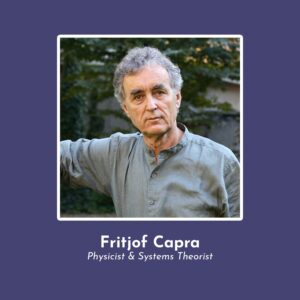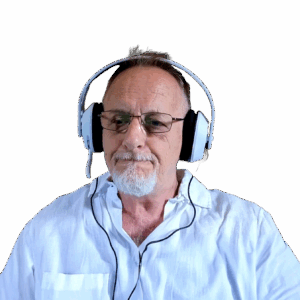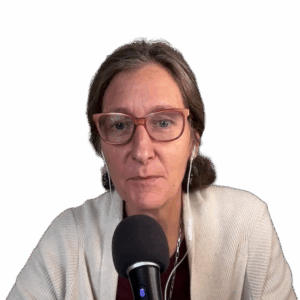
Ep 138 | Fritjof Capra
Fritjof Capra: “The Physics of Connection: Understanding Relationships and Ecology”
Show Summary
Without a systems lens, the full reality of the human predicament will never be understood. It is only when we adopt this kind of holistic, wide-boundary thinking that we are able to see the complexity and nuance of how the biosphere, geopolitics, economics, energy, and many other systems interplay with and influence one another. But historically, the scientific community didn’t utilize the power of systems thinking until a few groundbreaking individuals advanced and popularized that way of looking at the world.
Today, Nate is joined by one of the great systems thinkers, physicist and deep ecologist Fritjof Capra, to explore how his worldview has been shaped by his decades of work in physics, ecology, and community development – and his conclusions that addressing our ecological and social crises will require a broader shift in our values and philosophies.
How are science and spirituality deeply entangled, despite often being falsely separated in modern culture? How would our ideas of consciousness change if we understood the interconnectedness of all life, and our place within it? What could our societies look like if we emphasized the importance of maintaining deeper relationships with the natural world, and prioritized human wellbeing over economic growth?
About Fritjof Capra
Fritjof Capra, Ph.D., is a physicist and systems theorist. He was a founding director (1995-2020) of the Center for Ecoliteracy in Berkeley, California. He serves on the faculty of the Amana-Key executive education program in São Paulo, Brazil and is a Fellow of Schumacher College in the UK. Capra is the author of several international bestsellers, including The Tao of Physics, The Web of Life, and The Science of Leonardo. He is coauthor of the multidisciplinary textbook, The Systems View of Life. Capra’s online course is based on his textbook.
In French, we have a motto that says that a simple drawing is often better than a long explanation. Jean-Marc Jancovici Carbone 4 President
That’s very understandable because with left atmosphere thinking, one of the problems is that you see everything as a series of problems that must have solutions. Iain McGilchrist Neuroscientist and Philosopher
We can’t have hundreds and hundreds of real relationships that are healthy because that requires time and effort and full attention and awareness of being in real relationship and conversation with the other human. Nate Hagens Director of ISEOF
This is the crux of the whole problem. Individual parts of nature are more valuable than the biocomplexity of nature. Thomas Crowther Founder Restor
Show Notes & Links to Learn More
Download transcript00:00 – Fritjof Capra works + info, Center for Ecoliteracy, Books: The Tao of Physics + The Web of Life + The Systems View of Life, Capra course
02:52 – Werner Heisenberg, Physics and Philosophy
03:33 – Quantum Theory
04:42 – 1960s counterculture
05:30 – The Beatles and the Maharishi + George Harrison and Ravi Shankar
06:30 – Transpersonal Psychology, Free Speech Movement, Civil Rights Movement, Prague Spring
07:30 – Papers: Parallels between Modern Physics and Eastern Mysticism + Modern Physics and Eastern Mysticism
08:25 – Green politics, New Age movement
08:49 – Book: The Turning Point
10:40 – Global Civil Society
11:00 – Economic Superorganism
14:15 – Women’s Liberation Movement
14:43 – Iron Curtain
16:47 – Pier Luigi Luisi
17:45 – Polycrisis
20:57 – Gregory Bateson, Lynn Margulis, Hazel Henderson
24:30 – Bhagavad Gita, Alan Watts, D.T. Suzuki
27:49 – Neo-Darwinism
29:58 – Genetic change through gene transfer: Horizontal gene transfer and adaptive evolution in bacteria
30:05 – Genetic change through genetic acquisition: Species creation through symbiosis + The endosymbiont hypothesis
32:30 – Article: Principles of Life
34:40 – Indigenous perceptions of the human-nature relationship
34:57 – All life is genetically related
36:08 – David Steindl-Rast
36:10 – Etymology: Spirit + Anima + Psyche
37:05 – John Coltrane, Ali Akbar Khan, Ravi Shankar
42:45 – Melatonin and sleep + the hypnagogic state
44:04 – Sleep onset and creativity
45:20 – Consciousness and language + language and culture
45:59 – Theory of mind functioning as a machine + treating Earth’s systems as a machine
46:19 – Santiago Theory, Humberto Maturana, Fransisco Varela
50:30 – Merlin bird app
51:34 – Adam Smith on wealth and wellbeing
51:59 – David Korten, Ecological Civilisation, history of economics Page 17
54:19 – Capra course
55:24 – Fridays for Future, Last Generation, Greta Thunberg
57:26 – Paper: Qualitative Growth






